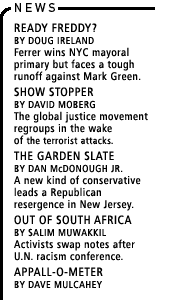|
|

|

|

|
|
|
| |
|
|
|
When the Joint Chiefs of Staff were looking for a name for the new war
There was a fundamental contradiction in Bush's speech, which went largely unremarked in the unadulterated gush of praise that immediately followed it. Rolling up and eliminating the hydra-headed networks of the terrorist diaspora, the worthy goal to which Bush pledged the nation and its resources, is essentially a law enforcement problem of planetary scope. That requires an unprecedented level of international political cooperation, which in turn demands maximum political stability around the world. But Bush's decision to militarize the anti-terrorist campaign will inevitably undermine these prerequisites. Bush called al-Qaeda—the bin Laden-created umbrella network—"the Mafia" of terrorism. But one doesn't go after the Mafia with B-1 and B-52 high-altitude bombers, or with ground troops or special forces commandos. The minute the bombs start falling, there will be civilian casualties. Muslim ones. And that will only deepen the political instability of those regimes—many of them unsavory and already plagued with Islamist fundamentalisms of virulent character and widespread popular appeal—that are precisely the governments whose cooperation is crucial to identifying, detaining and prosecuting the terrorists. Leslie Gelb, the former New York Times columnist who now runs the Council on Foreign Relations, got it right when he said on PBS after the speech that it was "a declaration of war on Afghanistan and probably Iraq." And Bush's implacability in declaring he'll "make no distinction" between terrorists and the nations harboring them could soon add other countries to the list. When Bush ran for president, he pledged never to send American armed forces abroad in any operation without an "exit strategy." In militarizing the campaign against terrorism, he doesn't have one. Eliminating the repulsive bin Laden alone will not stop terrorism. Nor will deposing the Taliban, even if Bush succeeds in doing so. Who will Bush put in their place—the fractious Northern Alliance, composed of distinctly minoritarian ethnic groups? The exiled King Mohammed Zahir Shah, who is 86 and has not set foot in the country since being overthrown in 1973? When reporters asked Bush spokesman Ari Fleischer whom we were going to fight for in Afghanistan, he pointedly refused to say (although the United States has been meeting secretly in Switzerland with representatives of Italy—Zahir's host and sponsor—Iran, and several other countries to plot a new role for the king). There are also credible reports from inside Afghanistan that a number of local warlords and Taliban commanders are preparing to stage a coup—but military action against the country now would undercut such efforts by rallying people to the Taliban. And what of Iraq? Jesse Helms told CNN that we should expect an attack on Iraq "right soon." Following this, the administration began leaking that there were no immediate plans to attack Iraq. But the stepped-up bombing of Iraq's southern air defenses in the three days preceding Bush's speech to Congress spoke louder than the latest leaks. Now the Americans and the Brits have renewed and intensified those aerial assaults. Disinformation is a weapon in this new war. Bush is an uncultured man who knew little of the exterior world until he began running for president—and couldn't have cared less. As a result, he has committed serious verbal blunders whenever his handlers let him off the leash without a prepared text. Thus, when the historically illiterate Bush called his new war a "crusade," it conjured up for all the Muslim world the image of hoards of Knights Templar pillaging Islam a millennium ago. Bush's speechwriters tried to compensate for this ignorant misstep by including in his speech to Congress affirmations that this is not a war against Islam. Too late, as the anti-U.S., pro-bin Laden demonstrations in a wide swath of the Islamic world—from Somalia to Indonesia—have shown. Bin Laden himself seized on this verbal cockup to score propaganda points in his letter to the al-Jazeera Arab TV network, referring to the "Jewish-Christian crusade" and to Bush as the "chief crusader." Here at home, the revulsion felt at the terrorist attacks, as expected, has translated into a sharp lurch to the right. There was only one vote cast in the House against the resolution giving Bush full powers to militarize the anti-terrorist campaign (by Barbara Lee, the African-American Democrat from the safe Oakland, California seat formerly held by Ron Dellums). And there was not a single vote in the Senate against this new Gulf of Tonkin resolution giving Bush a blank check (contrast this with the 52 to 47 Senate vote authorizing Bush pere's Gulf War). Bush, with his Wild West, "dead-or-alive" rhetoric, has surfed the wave of nationalist sentiment to unprecedented popularity—90 percent, the highest ever for a president in the Gallup poll, one point higher than his father's at the end of the Gulf War. And the Democrats in Congress have been cowed into silence: No criticism of Bush passes their lips for fear of revenge by the voters next year. The fulsome embrace between Bush and Tom Daschle after the president's speech to Congress said it all: Daschle, who now talks to Bush three and four times daily, is in the president's pocket. In the House, Dick Gephardt is cutting deals in the back room with Speaker Dennis Hastert—and, while there is some grumbling among Democratic members about their exclusion from this process, it doesn't amount to much (only 54 votes against the first installment in the airline bailout, for example). Although the economy was already in recession before the attacks—and is headed for even more serious trouble—it isn't hurting Bush. As CNN polling analyst Bill Schneider put it, "It's no longer the Bush economy, it's the bin Laden economy." The left had always hoped that when the overheated economy tanked, the downturn would provide fertile ground for a shift back to a more progressive politics; instead, it's having the opposite effect. On the first day Wall Street reopened for business a week after the attacks on the Twin Towers, Treasury Secretary Paul O'Neill went on Jim Lehrer's NewsHour to predict "record market highs." At week's end, of course, the stock market had recorded its biggest loss since 1933: $1.4 trillion in America's paper wealth had gone up in smoke. Now we are being told that it's un-American to sell one's stocks. The classic slogan of consumer hucksterism, "Buy and Save," has been elevated to a moral imperative. Typical was the impassioned plea on Larry King by New Mexico's Pete Domenici, the GOP's chief Senate spokesman on budget matters: "If you have money put aside toward a new home, buy it! If you've set aside money for a new car, buy it! If you have money for new clothes, buy it!" [sic]—all to help "save the economy from terrorism." Even the unions seem to be caught up in what former Labor Secretary Robert Reich derided in a Washington Post opinion piece as "market patriotism": In New York, for example, the union leaders who sit as trustees of the municipal employees' pension funds gave their enthusiastic approval to invest $800 million of the workers' retirement fund in Wall Street to help it climb back from the disastrous losses—a suicidal plan hatched by Mayor Rudy Giuliani with the collusion of the city's top elected Democrats. And AFL-CIO President John Sweeney has linked arms with U.S. Chamber of Commerce head Tom Donahue in a campaign for "investment in the economy." Nationalist politics makes strange bedfellows, indeed. But, as the excellent Alan Abelson wrote in Barron's, "To equate buying stock with patriotism or selling stock with a lack of patriotism is balderdash, the equivalent of praising or damning a thermometer for the temperature it records." The war frenzy is causing a revival of the most reactionary features of Republican trickle-down economics, despite the failure of Bush's economically impotent tax cut: With flag-draped rhetoric, the congressional GOP has revived the capital gains tax cut, which appears likely to garner enough Democratic votes to pass as an "economic stimulus" measure to help finance the war. A tax cut to finance the war? Bizarre. And even though the terrorist attacks showed the utter folly of investing billions in the irrelevant, open-ended boondoggle known as Star Wars, Democratic opposition seems to be collapsing. Michigan Democrat Carl Levin, chairman of the Senate Armed Services Committee, has already agreed to withdraw his amendment that had been the chief stumbling block to Senate approval of Star Wars (a requirement that the system could not be tested without prior congressional approval—even though such tests would violate the ABM treaty). From campaign finance reform to the fight against AIDS, everything but the war is on hold in Congress for the foreseeable future. (The lone exception: Bush's education proposal, which he and Daschle are fashioning into a bipartisan one; score another triumph for the president—it will pass before Thanksgiving.) Bipartisan nationalism means the Democrats will have no issues to take to the country in the 2002 elections. As Democratic pollster Geoff Garin told the Washington Post: "For the moment, at least the electorate is on a war footing and everything else about politics flows from that fact. The voters ask themselves on every issue the fundamental question: How does it relate to defeating terrorism and making the country more secure?" Behind the scenes in Washington, the debate that's getting the most attention is the one over the form and scope of the Office of Homeland Security, to be headed by Pennsylvania Gov. Tom Ridge. While Bush administration officials leaked to the Wall Street Journal that Ridge's job "can be compared to the National Security Adviser" and he'll operate "above the bureaucracy" (40 different government agencies are involved in the anti-terrorism effort), Congress will have other plans. Presidentially ambitious Sen. Joe Lieberman, the Connecticut DLCer, is preparing a bill to create a super-agency, a kind of all-powerful Ministry of the Interior on the European model, and the bureaucrats already have their box-cutters out for the bitter turf wars. The infighting and lobbying by institutional pachyderms of notorious incompetence, like the FBI, is already getting bitter. As Senator John Kerry told CNN in a laughable understatement: "There's nothing more difficult in Washington than rearranging the deck chairs." What of our civil liberties in all this? Lieberman has already called on all Americans to become "citizen-soldiers" and, in effect, spy on their neighbors. What this means in practice in the current climate of xenophobia can be seen in the Arab-bashing by Louisiana Republican Rep. John Cooksey in his call for ethnic profiling: "When you've got a guy wearing a diaper on his head, with a fan belt around the diaper, that guy has got to be pulled over." (Just imagine the effect of this rancid racism when it is reported in the Muslim world.) Now the Bush administration is planning to propose adoption of the Orwellian FaceInt system of "facial profiling," in which security cameras of the kind used in banks, stores and on the streets of many cities are linked by computer to digitized facial profiles of suspects which, the proponents claim, are as accurate as fingerprints. The adoption of a national ID card will sail through Congress with no difficulty—soon you won't be able to leave home without this odious aussweiss. It took the Senate only 30 minutes to expand government wiretapping as well as Internet surveillance through the Carnivore system (a Big Brother legacy of the Clinton administration that allows the feds to monitor the Internet), and there's more to come. The Wall Street Journal predicts that the government will know "where you surf, patterns of e-mail use, what you buy," as well as what you say. The FBI has descended on college campuses across the country demanding the educational records of students—and getting them—under the "health and safety" loophole of the Family Educational Privacy Act, which was passed in the '70s after revelations of massive government spying on students. Bills are being introduced to shred that law's protections even further. As these words are written two weeks after the attacks comes news of a small, momentary victory for liberty: The Republicans who control the House Judiciary committee had tried to force through Attorney General Ashcroft's anti-terrorism package in just 24 hours, with no hearings and no debate. But skirmishing by committee Democrats under the leadership of Michigan Rep. John Conyers succeeded in getting action postponed for a week. Conyers contends that at least six of its provisions are unconstitutional—including a provision for the preventive detention in perpetuity and without trial of noncitizen terrorist "suspects." (Hundreds of Americans, as well as foreigners, are already being held without charges, and no one seems terribly concerned about their rights.) Conyers comes from a safe seat that has re-elected him for three decades and can say what he wants; this staunch civil libertarian is a walking argument against term limits. But that doesn't detract from his courage in writing a tart Washington Post op-ed piece quoting Benjamin Franklin's injunction—"They that can give up essential liberty to obtain a little temporary safety deserve neither liberty nor safety." To which Conyers added: "We must ensure that these acts of terror do not accomplish in a 'slow burn' what the fires of the World Trade Center and the Pentagon could not—subversively destroying the foundation of our democracy." That kind of thinking is, sadly, distinctly in the minority among the governing classes. Nat Hentoff warned right after the attacks of the dangers of "a new McCarthyism." There are signs Hentoff's prediction is coming true. There's a vicious organized campaign by right-wing groups to purge ABC's Politically Incorrect host Bill Maher from the airwaves for having the temerity to suggest that raining cruise missiles on Afghanistan was "cowardly." A raft of local stations, including ABC's Washington affiliate, have already taken his show off the air. Will the network owned by Disney—always concerned for its "family" image—have the courage to resist this hysteria? And the Murdoch press is already in full cry against anyone who dares enter a demurrer to rampant jingoism. New York Post columnist John Podhoretz (a dimmer version of his indigestible parent, Norman) spewed anti-intellectual bile at Susan Sontag for a brief comment in The New Yorker that Congress' "unanimously applauded, self-congratulatory [pro-war] bromides" reminded her of the "Soviet Party Congress"; he also flayed The Nation as "the magazine that supported Stalin, Ho Chi Minh, the Sandinistas and the El Salvadoran guerrillas and the Palestinian terrorists and anyone else who made it his mission to destroy democracy and capitalism." The New Republic's callow editor, Peter Beinart, penned a far-fetched attack on the anti-globalization movement as the handmaiden of terrorism. You can turn on the Fox Network at almost any hour to hear more of the same. The attempt to stifle dissent is well underway. And as the long
war drags on, the worse it will get.
|





